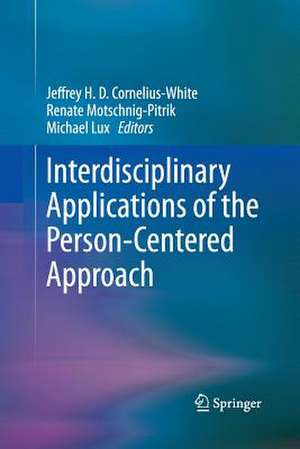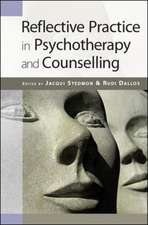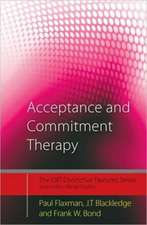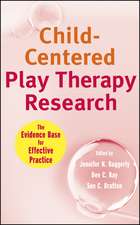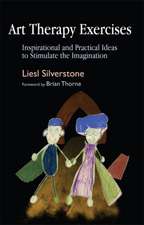Interdisciplinary Applications of the Person-Centered Approach
Editat de Jeffrey H. D. Cornelius-White, Renate Motschnig-Pitrik, Michael Luxen Limba Engleză Paperback – 7 iul 2015
| Toate formatele și edițiile | Preț | Express |
|---|---|---|
| Paperback (1) | 368.00 lei 43-57 zile | |
| Springer – 7 iul 2015 | 368.00 lei 43-57 zile | |
| Hardback (1) | 375.13 lei 43-57 zile | |
| Springer – 4 iun 2013 | 375.13 lei 43-57 zile |
Preț: 368.00 lei
Preț vechi: 387.38 lei
-5% Nou
Puncte Express: 552
Preț estimativ în valută:
70.42€ • 73.71$ • 58.61£
70.42€ • 73.71$ • 58.61£
Carte tipărită la comandă
Livrare economică 31 martie-14 aprilie
Preluare comenzi: 021 569.72.76
Specificații
ISBN-13: 9781489998002
ISBN-10: 1489998004
Pagini: 284
Ilustrații: XVII, 265 p.
Dimensiuni: 155 x 235 x 15 mm
Greutate: 0.4 kg
Ediția:2013
Editura: Springer
Colecția Springer
Locul publicării:New York, NY, United States
ISBN-10: 1489998004
Pagini: 284
Ilustrații: XVII, 265 p.
Dimensiuni: 155 x 235 x 15 mm
Greutate: 0.4 kg
Ediția:2013
Editura: Springer
Colecția Springer
Locul publicării:New York, NY, United States
Public țintă
Professional/practitionerCuprins
Introduction to Interdisciplinary Applications.- An Experiential Example of the Person-Centered Approach: Carl Rogers Work.- Person-Centered and Experiential Psychotherapies: An overview.- Motivational Interviewing and Client-Centered Therapy.- Linking the Person-Centered Approach to the Arts: Person-Centered Expressive Arts Therapy and Empowerment.- Person-centered work in services for people in need of everyday care.- Counseling the Sai Way.- Person-Centred Medicine and Subjectivity.- The Learner-Centered Model: Vision for the Future.- The Person-Centered Approach in Adult Education.- Characteristics and Effects of Person-Centered Technology Enhanced Learning.- Ubiquitous Educational Computing and Learner-Centered Instruction: A Likely Pair.- Foundational Oppression: Families and Schools.- The Person-Centered Approach in Family Education.- Successful Management with the Person-Centered Approach: Building the Bridge to Business.- Person-Centered Approach: Theory and Practice in a Nontherapeutic Context.- A Person-Centered-Approach to Innovation Management: Experiences and Learnings.- The Person-Centred Approach and its Capacity to EnhanceConstructive International Communication.- Conflict Transformation.- PCA Encounter Groups: Transformative learning for individuals and communities.- Staying Human: Experiences of a Therapist and Political Activist.- The Person-Centered Approach: An Emergent Paradigm.
Notă biografică
Jeffrey H. D. Cornelius-White, Psy.D., LPC is Professor of Counseling at Missouri State University and doctoral faculty at the University of Missouri-Columbia. He is former editor of The Person-Centered Journal and former chair of the World Association for Person-Centered and Experiential Psychotherapy and Counseling. He has published more than 75 works, including Learner-Centered Instruction (Sage, 2010 with Adam Harbaugh), Facilitating Young People’s Development (PCCS, 2008 with Michael Behr), and Carl Rogers: The China Diary (PCCS, 2012). Jef studied at the Chicago Counseling Center and the Pre-Therapy Institute and is a graduate of Argosy University-Chicago. He enjoys cycling, volleyball, his friends and family.
Renate Motschnig-Pitrik, born in Ostrava, Czech Republic, is a professor of computer science and head of the Computer Science Didactics and Learning Research Center at the University of Vienna, Austria. Renate held positions at the RWTH Aachen in Germany, the University of Toronto, Canada, and teaches and cooperates with the Masaryk University in Brno, Czech Republic. She participated in encounter groups and several events based on the Person-Centered Approach. She is deeply interested in the multiple ways in which mutual understanding and whole-person learning happen. She is an author/co-author of more than 130 scientific articles, one book, and is determined to foster a style in education that is based on person-centered attitudes, our co-actualizing potential, and thoughtful support by web-based technology. She appreciates synergies between presence and distance, and a multitude of (scientific) disciplines and cultures.
Michael Lux, born in Stuttgart, Germany, has Master degrees in psychology and gerontology. He is a certified person-centered psychotherapist and works as a psychotherapist and neuropsychologist in the Neurological Rehabilitation Center Quellenhof in BadWildbad, Germany. Over the past few years, he has been intensively engaged with linkages between the Person-Centered Approach (PCA) and neuroscience. As a result he developed the model of a neuroscientifically based person-centered psychotherapy, which he described in a book and in scientific articles. Furthermore, he gives lectures and workshops on the neuroscientific bases of the PCA at conferences and training institutes.
Renate Motschnig-Pitrik, born in Ostrava, Czech Republic, is a professor of computer science and head of the Computer Science Didactics and Learning Research Center at the University of Vienna, Austria. Renate held positions at the RWTH Aachen in Germany, the University of Toronto, Canada, and teaches and cooperates with the Masaryk University in Brno, Czech Republic. She participated in encounter groups and several events based on the Person-Centered Approach. She is deeply interested in the multiple ways in which mutual understanding and whole-person learning happen. She is an author/co-author of more than 130 scientific articles, one book, and is determined to foster a style in education that is based on person-centered attitudes, our co-actualizing potential, and thoughtful support by web-based technology. She appreciates synergies between presence and distance, and a multitude of (scientific) disciplines and cultures.
Michael Lux, born in Stuttgart, Germany, has Master degrees in psychology and gerontology. He is a certified person-centered psychotherapist and works as a psychotherapist and neuropsychologist in the Neurological Rehabilitation Center Quellenhof in BadWildbad, Germany. Over the past few years, he has been intensively engaged with linkages between the Person-Centered Approach (PCA) and neuroscience. As a result he developed the model of a neuroscientifically based person-centered psychotherapy, which he described in a book and in scientific articles. Furthermore, he gives lectures and workshops on the neuroscientific bases of the PCA at conferences and training institutes.
Textul de pe ultima copertă
The hallmark of Carl Rogers' work, the Person-Centered Approach (PCA), has long had a major impact on psychological research and clinical practice. Currently, as more diverse professionals recognize the relevance of humanistic thought to their fields, it is enjoying a wider diversity of applications across disciplines, populations, and settings.
Interdisciplinary Applications of the Person-Centered Approach unfolds client-centered concepts into real-world contexts. The versatility and power of person-centered practice are on full display in an engaging integrative framework, featuring extended examples, practical guidelines, and graphic concept maps. Renowned scholar-practitioners illustrate innovative applications as diverse as motivational interviewing, parent training, learner-centered instruction, and peace negotiations to promote cross-disciplinary dialogue and collaboration, and potentially to solve larger societal problems. Support for the PCA spans a variety of areas including:
• Clinical applications in psychotherapy and medicine.
• Education, including elementary, higher, adult, and e-learning.
• Child, family, and lifespan studies.
• Business, management, leadership, and coaching.
• Conflict resolution and constructive communication.
Interdisciplinary Applications of the Person-Centered Approach complements its companion volume, Interdisciplinary Handbook of the Person-Centered Approach: Research and Theory, by enlightening researchers and practitioners who want to broaden their academic and clinical horizons. Both are significant resources for researchers in a variety of sciences, such as psychology, neuroscience, therapy, education, communication, and medicine, and for students of humanistic psychology.
Interdisciplinary Applications of the Person-Centered Approach unfolds client-centered concepts into real-world contexts. The versatility and power of person-centered practice are on full display in an engaging integrative framework, featuring extended examples, practical guidelines, and graphic concept maps. Renowned scholar-practitioners illustrate innovative applications as diverse as motivational interviewing, parent training, learner-centered instruction, and peace negotiations to promote cross-disciplinary dialogue and collaboration, and potentially to solve larger societal problems. Support for the PCA spans a variety of areas including:
• Clinical applications in psychotherapy and medicine.
• Education, including elementary, higher, adult, and e-learning.
• Child, family, and lifespan studies.
• Business, management, leadership, and coaching.
• Conflict resolution and constructive communication.
Interdisciplinary Applications of the Person-Centered Approach complements its companion volume, Interdisciplinary Handbook of the Person-Centered Approach: Research and Theory, by enlightening researchers and practitioners who want to broaden their academic and clinical horizons. Both are significant resources for researchers in a variety of sciences, such as psychology, neuroscience, therapy, education, communication, and medicine, and for students of humanistic psychology.
Caracteristici
Explores the power, depth and scientific impact of the Person-Centered Approach (PCA) Show connections of PCA to international and interdisciplinary studies Demonstrates PCA as a meta-approach with evidence-based approach?
